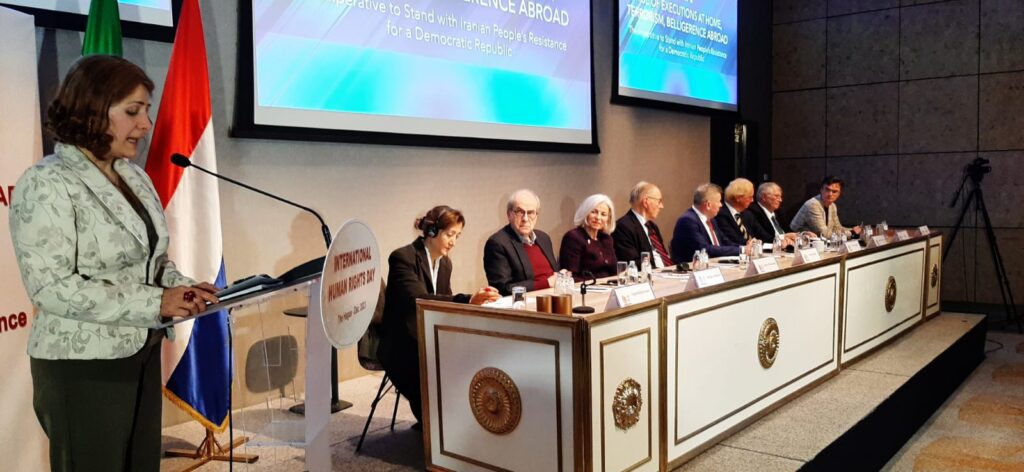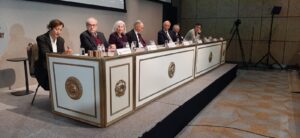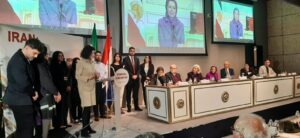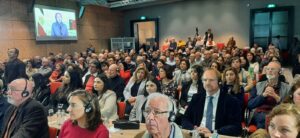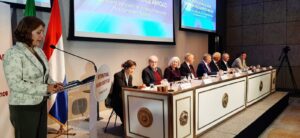Just before World Human Rights Day, a gathering took place in the Netherlands hosting members of the Dutch Parliament, political dignitaries, and representatives from the Iranian community. Mrs. Maryam Rajavi, serving as the president-elect of the National Council of Resistance of Iran (NCRI), delivered a keynote address to the online audience during this conference.
In her speech, Mrs. Maryam Rajavi strongly implicates Ebrahim Raisi in severe human rights violations spanning decades. She highlighted his alleged involvement in the 1988 massacre and subsequent crackdowns on dissent, calling for accountability rather than his participation in international forums.
Mrs. Rajavi proposed four key actions to address the situation in Iran, emphasizing the need to designate the IRGC as a terrorist entity, activate Security Council Resolution 2231’s snapback mechanism, subject the regime to Chapter VII of the UN Charter, and recognize the Iranian people’s struggle against the oppressive regime.
Dorien Rookmaker, a member of the European Parliament from the Netherlands, vehemently denounced the recurring instances of genocide within the theocratic regime, highlighting events like the 1988 massacre, the 2019 and 2020 uprisings, and the alarming surge in executions in 2023.
Expressing profound apprehension, MEP Rookmaker criticized the UNHCR’s invitation to President Raisi for the Geneva event, urging the international community to condemn this action. She also criticized the ongoing impunity concerning the 1988 massacre while commending the Iranian Resistance for its unwavering determination to pursue justice and hold the Iranian regime accountable.
MEP Rookmaker stated, “In the coming month, the Iranian judicial authorities plan to hold a sham court in Tehran to try members of the resistance in absentia. We must question why such ridiculous scenes are permitted by this regime. The answer lies primarily in the inaction of the West. And we have to look into this, and we have to take action. The Mullahs interpreted this lack of firm action as a signal that the West would continue to appease them. It is crucial that we as members of the European Parliament or members of our national parliaments express the true sentiments of the European people and their values.”
She added, “The reality is that the Iranian regime can no longer deceive the international community. People demand justice in Iran, especially today. We stand with the men and women, the young girls and boys of Iran who have clearly said in Iran protests, down with the oppressor, be it the Shah or Khamenei. They have denounced any form of dictatorship.”
During his address, Ad Melkert, former Special Representative of the UN Secretary-General and Head of the UN Assistance Mission to Iraq, strongly criticized the continual human rights violations by the Iranian regime. He emphasized the significance of the regime’s expulsion from the UN Group on Women’s Rights in December 2022 as a significant decision by the global community, aiming to strongly protest the infringement upon women’s rights.
Furthermore, Mr. Melkert highlighted a recent resolution passed by the European Parliament, which condemned the regime’s transgressions related to women’s rights and the unjustified detention of European Union citizens.
Expressing concern over the Iranian regime’s president Ebrahim Raisi’s planned participation in the 2023 Global Refugee Forum in Geneva, he said, “Human rights organizations have called for the prosecution of Raisi for his involvement in crimes against humanity as a member of the Tehran Death Commission during the 1988 mass extrajudicial executions and enforced disappearances of political prisoners. International bodies, including the UN Special Procedures, have condemned all these events, and he should be held accountable for the killing of the protesters in November 2019 while he was head of the judiciary, and for the killing of 750 individuals and the arrest of 30,000 during the 2022 uprising under his presidency.”
During her speech, former Colombian Senator and Presidential candidate Ingrid Betancourt shed light on Tehran’s increasing influence in Europe, urging Western governments to reconsider their strategies. Mrs. Betancourt brought attention to concerning incidents involving the regime, such as a thwarted bombing attempt in 2018 and the recent shooting of the former First Vice President of the European Parliament, Alejo Vidal Quadras, in Madrid.
Accusing the Iranian regime of employing a sophisticated disinformation campaign, infiltrating European institutions, and manipulating public opinion, Betancourt highlighted leaked emails that revealed a concerted effort to sway Western decisions in Iran’s favor.
She criticized the feeble response of Western governments to Tehran’s actions, stressing the necessity for a unified stance against the regime’s terrorist activities. Betancourt emphasized the crucial role played by the National Council of Resistance of Iran (NCRI) and the Mujahedin-e Khalq (PMOI/MEK) as the sole democratic opposition to the mullahs, refuting claims that they lack political influence in Iran.
Regarding the regime’s tactics involving journalists, academics, and self-proclaimed “Iran experts,” she remarked, “Their aim is not only to manipulate public opinion to influence governments but also to discredit the only democratic opposition to the Iranian government, the National Council of Resistance of Iran, the MEK… They will tell us it’s a cult.”
Betancourt shared her initial skepticism about the Mujahedin-e Khalq (MEK) after encountering a flood of negative information and podcasts portraying them as terrorists, communists, and misogynists following a meeting with the NCRI. Due to her past abduction experience under a communist organization, she investigated further to distinguish between genuine resistance forces and terrorists.
In his address to the conference, Professor Henk de Haan, former Chairman of the Foreign Affairs Committee in the Dutch Parliament, delivered a scathing critique of the Iranian regime’s oppressive tactics and called for international action to address the ongoing human rights violations.
Reminiscing about his experiences serving the Friends of Free Iran (FOFI), Prof. de Haan highlighted the historical context of his involvement, recalling meetings with members of the Iranian Resistance in the Netherlands at a time when the (PMOI) was still on the prohibited list. He narrated the challenges faced by those associated with the PMOI and their subsequent removal from the terrorist organization’s list due to international efforts.
The former committee chairman condemned the Iranian regime, labeling it a “criminal regime” and emphasizing the need for collective action against it. He lamented the staggering number of executions in Iran, stating that the situation had not improved over the years but had worsened.
Drawing attention to the commitment of FOFI representatives, Prof. de Haan commended their recent initiative urging the Dutch government to categorize the revolutionary grounds and its leaders as a banned organization. He also urged the Dutch government to intensify efforts to include the Iranian regime on the list of terrorist organizations. He underscored the necessity for private individuals in the Netherlands to boycott business dealings with Iran, further isolating the regime.
Former Dutch Senator and renowned Chess Grandmaster Loek van Wely delivered a speech at this event, expressing his commitment to contributing to the cause of a free Iran. Expressing gratitude for the invitation, van Wely acknowledged the chilling impact of the exhibition on the sacrifices made by individuals in the pursuit of freedom.
Reflecting on his participation in a chess tournament in Iran, Senator van Wely discussed the complexities of engaging in sports in a politically charged environment. He underscored the limitations imposed on athletes under the current regime, emphasizing the need for change.
Transitioning to the political arena, van Wely addressed the slow political process and stressed the importance of sustained pressure for change. He expressed support for listing the Islamic Revolutionary Guard Corps as a terrorist organization.
In his address to the meeting, former Dutch MP Derk Jan Eppink emphasized the growing threat of the Iranian fundamentalist regime, particularly focusing on the role of the Iranian Revolutionary Guard. MP Eppink called for the inclusion of the Islamic Revolutionary Guard Corps on the EU terrorist list, citing recent terrorist activities and expressing concern over Tehran’s advancing nuclear ambitions. He criticized diplomatic engagement with the regime, revealing disturbing details of its support for regional terrorist groups and wreaking havoc in the Middle East.
MP Eppink also criticized the Dutch Minister of Foreign Affairs for speaking with the regime’s foreign minister Hossein Amir-Abdollahian and legitimizing the regime. He called out Amir-Abdollahian for being a member of the Basij and stated that a violent figure like him belongs in prison.
MP Eppink warned of a burgeoning alliance between Iran and Russia, urging Western nations to condemn the regime’s president Ebrahim Raisi and boycott his international participation. In conclusion, MP Eppink called for decisive action against Tehran, urging comprehensive sanctions against key regime figures and the IRGC.
Former Dutch Senator Bob van Pareren expressed his support for the Iranian people’s quest for freedom and democracy. He condemned the oppressive rule of Iran’s current regime, highlighting daily atrocities and advocating for international action against the prominence of its leaders.
Senator van Pareren strongly condemned Ebrahim Raisi’s upcoming visit to Geneva and urged colleagues and governments to prevent it. Acknowledging the challenges faced by the Iranian diaspora, he praised their perseverance and courage in advocating for change.
Commending Mrs. Maryam Rajavi’s leadership, van Pareren outlined key points for a future democratic Iran, emphasizing equality and freedom. He concluded by assuring the Iranian people of the Netherlands full support and commitment to actively join the fight for a better future.
In his speech, former Dutch Senator Prof. Kees De Lange addressed the gathering by drawing attention to the alarming number of executions in Iran, which has reached 743 since the beginning of 2023.
He stressed the urgency of addressing the regime’s threat not only to its citizens but also to regional stability. He emphasized the link between Tehran’s support for terrorist organizations and the heightened tensions in the Middle East. Prof. De Lange echoed the NCRI’s assertion that the head of the snake lies in Tehran, indicating that the Iranian regime is the primary cause of the current conflicts in the region.
The former Dutch Senator discussed the Iranian regime’s need for external conflicts to maintain power, citing the fear of a popular uprising as a significant concern for its own instability. He condemned the upcoming visit of Ebrahim Raisi to a United Nations convention in Geneva, urging the international community to unite in preventing this event.
Prof. De Lange proposed a set of actions to address the Iranian regime, including designating the Islamic Revolutionary Guard Corps as a terrorist organization, implementing maximum sanctions, rejecting appeasement, opposing nuclear arms development, and supporting the democratic opposition, particularly the NCRI and its leader, Maryam Rajavi.
In his concluding remarks, Prof. De Lange emphasized the importance of holding the Iranian regime accountable and standing in solidarity with the Iranian people striving for freedom. He called on the world to unite on this International Day of Human Rights to work towards justice, peace, and freedom for all oppressed populations, especially those under the Iranian regime.
Ms. Dowlat Nowruzi, the NCRI Representative in the UK, highlighted the Iranian people’s rejection of dictatorship, calling for international attention to human rights violations and the regime’s atrocities.
She condemned the presence of President Raisi at the Geneva UN forum, urging the cancellation of his invitation and prosecution for crimes against humanity. Ms. Nowruzi also called for comprehensive sanctions against the regime, emphasizing the need to blacklist the IRGC and halt their support for terrorism.
Addressing a misinformation campaign against the opposition, the NCRI Representative in the UK discredited the regime’s judiciary and called for global rejection of its credibility. She concluded explicitly, “One of their efforts has been a sort of a masquerade, they call it a court, against 104 officials of the MEK, the main people who sacrificed all they have for decades and decades in order to bring democracy and freedom back to the Iranian people. Now the court and the masquerade are claiming that they are producing files of allegations against the leaders of the opposition. That must be absolutely condemned.
In his remarks, Mr. Hans Noot, Vice Chair of the Human Rights Without Frontiers in Brussels, shed light on the ongoing human rights violations in Iran. Also representing the Gerard Noot Foundation, he expressed grave concern over the 1988 massacre of political prisoners and other atrocities committed by the Iranian regime.
Mr. Noot decried the scheduled visit of Ebrahim Raisi to the Global Refugee Forum in Geneva, emphasizing the need to express outrage at the presence of one of the main perpetrators of mass murders in Iran.
He also described instances of police harassment, attacks, arrests, threats of execution, and tight surveillance against minority groups in Iran. Mr. Noot emphasized that Tehran’s disclosed atrocities are merely the tip of the iceberg, painting a grim picture of a regime that disregards human rights, citizens, and peace in the region. He saluted the victims and heroes fighting for accountability, urging international action against the Iranian regime’s ongoing violations.
Ferry Wever, Secretary of the Dutch Committee of Friends for a Free Iran, commenced his speech by extending heartfelt wishes for the speedy recovery of Prof. Vidal Quadras, emphasizing the collective strength to resist the Iranian regime’s oppressive tactics.
Acknowledging the growing support from the Dutch Parliament and Senate, Mr. Wever emphasized the need for continuous efforts to oust the oppressive regime. He cautioned against misinformation and disinformation, particularly focusing on the regime’s attempts to manipulate international organizations like Interpol using false accusations.
Mr. Wever urged vigilance against extremism, emphasizing the danger of false narratives and their impact on people’s lives. He discussed the ongoing violations reported by organizations like Amnesty International and emphasized the need for sustained attention to ensure that these issues do not fade into obscurity.
Drawing attention to the Human Rights Museum in Ashraf 3, Mr. Wever described the intense and impressive exhibits depicting the historical struggles for freedom, dating back to the 1950s. He pleaded with the international community to condemn the United Nations’ invitation to Ebrahim Raisi, calling it shameful and unacceptable.
At this conference, members of the Iranian-Dutch community and young political activists took the stage to share poignant accounts of their personal experiences with the Iranian regime’s atrocities. They passionately articulated how, in the face of adversity, they discovered hope and resilience through their association with the Iranian Resistance, inspiring them to persevere in the ongoing struggle for freedom, democracy, and a brighter future in Iran.

